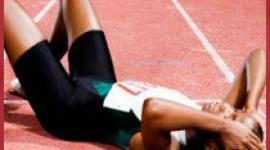Athletes and Eating Disorders
 Sports that require weight control and/or thinness can place their participants at risk for an eating disorder. There is a significant amount of pressure placed on athletes to perform at the highest level - at all costs. The dangers of this mindset can be enormous. Coaches and trainers must be informed and alert to the signs and symptoms of eating disorders in their athletes. Those closest to the athlete are in a unique position to provide positive guidance and promote healthy body image and self-esteem. While there are particular sports that place athletes at a higher risk, it is important to always be conscience of the messages we present our young male and female athletes.
Sports that require weight control and/or thinness can place their participants at risk for an eating disorder. There is a significant amount of pressure placed on athletes to perform at the highest level - at all costs. The dangers of this mindset can be enormous. Coaches and trainers must be informed and alert to the signs and symptoms of eating disorders in their athletes. Those closest to the athlete are in a unique position to provide positive guidance and promote healthy body image and self-esteem. While there are particular sports that place athletes at a higher risk, it is important to always be conscience of the messages we present our young male and female athletes.
Examples of "High Risk" sports:
- Gymnastics
- Swimming
- Ballet
- Wrestling
- Body Building
- Jockeying
- Rowing
- Diving
- Figure Skating
- Long distance running
At Risk Facts for Athletes:
- Perfectionistic tendencies, competitiveness, and fear of failure
- Pressure from coaches and parents
- Strong desire to please coaches and judges
- Misconceptions about body size and shape as it related to "peak performance" (i.e. weight loss will enhances one's performance, lean is mean, body fat is unacceptable, etc.)
- Over-emphasis or focus on external appearance (i.e. costumes uniforms, etc.)
- Critical eye of judges and subjective nature of some judging in competitions (i.e. judging on technical and artistic merit, etc.)
- Media messages about health and body shape size (i.e.-thin means healthy; thinness means success, etc.)
Medical Issues:
- Electrolyte imbalances
- Cardiac arrhythmia and increased risk of cardiac arrest
- Osteoporosis
- Severe dehydration and fatigue
- Muscle weakness and loss
- Kidney failure
For Coaches:
- Educate oneself on the dangers of eating disorders (i.e. what are signs and symptoms, what are the current resources in place at the school, community, etc.)
- Explore your own attitudes toward weight, dieting, body image, etc.
- Watch for signs and symptoms of eating disorders; prevention and recognizing symptoms in early onset are vital keys to avoiding serious medical and psychological problems.
- Emphasize improving performance and mental and emotional strength versus weight.
- Recognize when training routines are obsessive and unhealthy.
- Look for signs in which an athlete may be turning to extreme or drastic measures to be thin or succeed in their sport at the risk of their health.
- Consult with and use nutrition experts to educate athletes on healthy eating.
- Focus on the importance of eating properly.
- Encourage counseling when needed.
- Be supportive. Do not be critical if an athlete does come forward with their problem.
- Praise the athlete and be proud of them no matter what place they finish in a competition.
next: Eating Disorders and Their Impact on Relationships
~ eating disorders library
~ all articles on eating disorders
APA Reference
Gluck, S.
(2008, December 8). Athletes and Eating Disorders, HealthyPlace. Retrieved
on 2026, February 22 from https://www.healthyplace.com/eating-disorders/articles/athletes-and-eating-disorders



